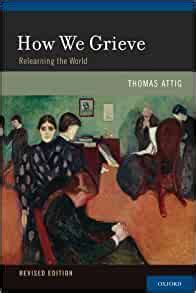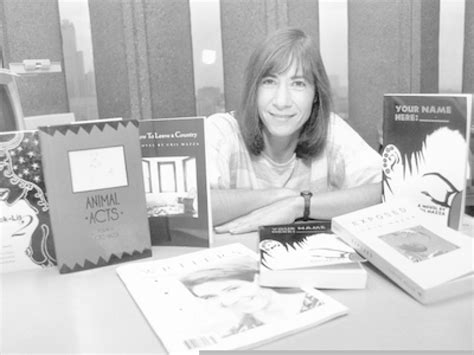A Quote by Elizabeth Lesser
There is an art to grieving. To grieve well the loss of anyone or anything--a parent, a love, a child, an era, a home, a job--is a creative act. It takes attention and patience and courage. But many of us do not know how to grieve. We were never taught, and we don't see examples of full-bodied grieving around us. Our culture favors the fast-food model of mourning--get over it quick and get back to work; affix the bandage of "closure" and move on.
Quote Topics
Act
Anyone
Anything
Around
Art
Attention
Back
Back To Work
Bandage
Child
Closure
Courage
Creative
Culture
Era
Examples
Fast
Favors
Food
Full
Get
Get Back
Get Over
Grieve
Grieving
Home
How
Job
Know
Know How
Loss
Love
Many
Model
Mourning
Move
Move On
Never
Our
Over
Over It
Parent
Patience
Quick
See
Takes
Taught
Us
Well
Were
Work
Related Quotes
Indeed, so deep is my pleasure in the work of the garden that, if there be a dimension after death in which grieving for the loss of the world of senses is possible, I shall grieve for no person however once agonisingly desired and passionately beloved, for no emotional adventure however uplifting, for no success however warming, no infamy however exhilarating, for nothing half so much as I shall grieve to the loss of the earth itself, the soil, the seeds, the plants, the very weeds... It is a love almost overriding my love the words that could express that love.
Every great loss demands that we choose life again. We need to grieve in order to do this. The pain we have not grieved over will always stand between us and life. When we don't grieve, a part of us becomes caught in the past like Lot's wife who, because she looked back, was turned into a pillar of salt.
Grief is not just a series of events, stages, or timelines. Our society places enormous pressure on us to get over loss, to get through grief. But how long do you grieve for a husband of fifty years, a teenager killed in a car accident, a four-year-old child: a year? Five years? Forever? The loss happens in time, in fact in a moment, but its aftermath lasts a lifetime.
I think the biggest thing that I have to do is to remind people that poetry is there for us to turn to not only to remind us that we're not alone - for example, if we are grieving the loss of someone - but also to help us celebrate our joys. That's why so many people I know who've gotten married will have a poem read at the wedding.
They had each other and there was a love between them that would withstand anything. Alina and I had always intuited, with no small wry pique, that, although our parents adored us and would do anything for us, they loved each other more. As far as I was concerned, that was the way it should be. Kids grow up, move on and find a love of their own. The empty nest shouldn't leave parents grieving. It should leave them ready and excited to get on with living their own adventure, which would, of course, include many visits to children and grandchildren.
It takes courage to grieve, to honor the pain we carry. We can grieve in tears or in meditative silence, in prayer or in song. In touching the pain of recent and long-held griefs, we come face to face with our genuine human vulnerability, with helplessness and hopelessness. These are the storm clouds of the heart.
Culture and society determined sexual desirability as what makes us important so long that it's part of our sensibility from birth.Little girls know. From around 2 or 3, the pretty ones already know how and why they get attention. And how quickly they learn to play it. Use it. And how quickly the rest of us figure out we don't have it.



































